Great to see this man back at the club, and well done to the excellent Alex Inglethorpe for seeking him out.
Liverpool legend Steve Heighway says Bill Shankly would approve of the side that is developing under Jurgen Klopp
2 Comments
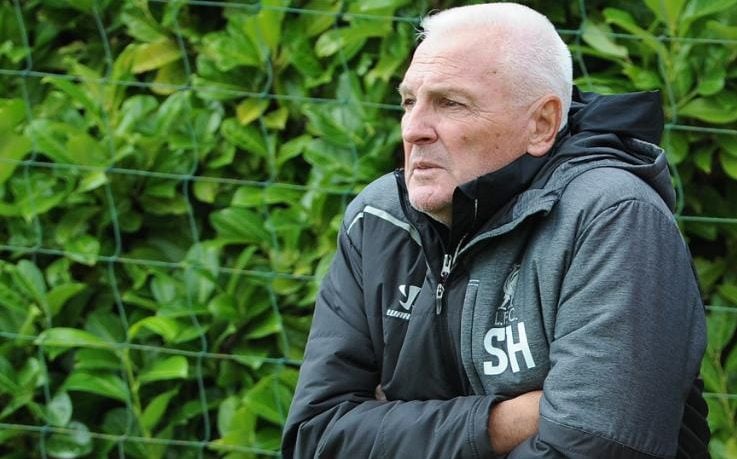
Steve Heighway oversaw the development of the Liverpool Academy before the Irishman left the club in 2007, but the former winger is now back at the club CREDIT:GETTY IMAGES
15 NOVEMBER 2016 • 6:48PM
Steve Heighway, legendary left winger, protégé of Bill Shankly and architect of Liverpool’s academy, thought he had retired.
Across four decades he had served the club as player, coach and, latterly, academy director, stepping down in 2007 and heading to Florida to spend free hours coaching youngsters at the Clearwater Charges – a club he founded.
His legacy was left to an assortment of successors taking his vision in a different direction. Then, two years ago, he received a surprise call from current academy director Alex Inglethorpe.
Inglethorpe wanted to restore and evolve the Heighway legacy that prompted his most famous apprentices Steven Gerrard, Jamie Carragher, Michael Owen, Robbie Fowler and Steve McManaman to cite him as the greatest of influences.
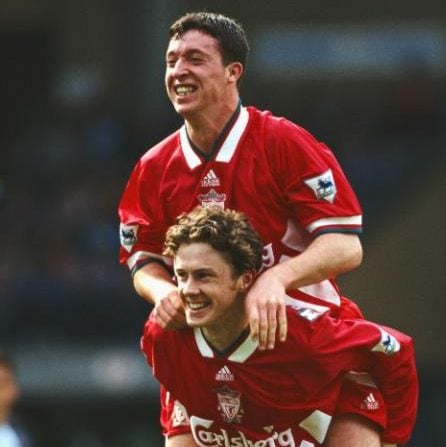
Robbie Fowler (top) and Steve McManaman both learned their trades under Heighway CREDIT: GETTY IMAGES
All had spoken to Inglethorpe and cursed the fact Heighway was no longer around, believing it an unhealthy consequence of the club’s debilitating internal politics during the tempestuous era of Tom Hicks and George Gillett Jr.
Heighway and Inglethorpe met in Formby Golf Club, a short drive from the Kirkby academy.
“I didn’t know Alex at that time,” says Heighway. “I was impressed with him from day one. He wanted to know what I felt to be the values, the ethics and the standards of Liverpool. The ideals. He had his own ideas, but wanted to get back to the basics of the foundation of what this club stands for.
“Then he invited me in for some evenings to work with the 12 and 13 year-olds. I didn’t want payment for it. It was such a joy to come back and work with the youngsters. It is like living a second childhood.”
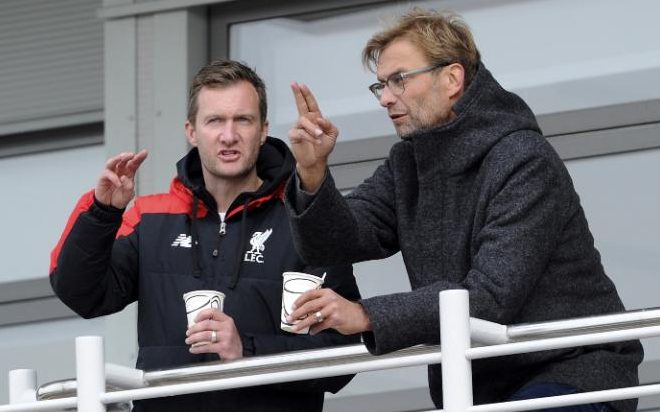
Alex Inglethorpe (left) and Jurgen Klopp in discussion at the club's Academy in Kirkby CREDIT: GETTY IMAGES
Last season, Inglethorpe formalised the arrangement, offering Heighway a mentoring role for coaches and players. Heighway is a full-time, paid Liverpool employee again, Inglethorpe determined the distinguished figures of the club’s past continue to shape its future.
“I had to give a lot of thought to how I conducted myself when I walked back in. I designed this place, but Alex is the director here. He’s the boss,” said Heighway, now just short of his 69th birthday.
“There was some emotion there. It meant a lot to my family. They were especially thrilled.”
Heighway’s return represents far more than the homecoming of an Anfield grandee. It is a symbol of a club restoration project.
Heighway left at time when the academy and first-team manager did not speak, let alone agree how to develop its young talent. In 2004 Liverpool decided to follow Arsenal’s ‘Fabregas model’ of signing overseas players in their mid to late teens. Disillusionment grew in Kirkby, where the local boys felt their route to the first team had an additional obstacle imposed by their own club. It was the essence of the philosophical argument that echoes across English football– is the shortage of England players due to lack of talent or opportunity?
“I never wanted to be piggy-in-the-middle of an intellectual debate. I saw youth development in a different way so it was time to exit stage left,” says Heighway.
“Rafa Benitez set up a mini-academy at Melwood. The children from here were not going to get the first look-in. There was no conflict. We just didn’t communicate.
“A manager must have what he wants. If the manager wants one thing and someone else wants something else, why would the board not support the manager? That would make no sense.
“But I didn’t leave with any sense of bitterness. I needed a rest. I was tired. It was hard running this place.
“We’d come from a youth department in 1989 working out of Melwood with a couple of coaches to this huge facility. I was put in charge when we built this in 1999 but I had no management skills. I was not trained to do it – it was on the hoof. By 2007 I was ready for a break.”
Heighway’s return is no mere emotional gesture. Inglethorpe recognised a visionary: a man of experience and immense intellectual weight - a moderniser connecting Liverpool not just to its glorious history but, perhaps more significantly, its conscience.
Heighway baulks at the idea of being perceived with such reverence, but you need only a few minutes in his company to realise coaching – and more specifically coaching Liverpool’s next generation - is a vocation, not a job.
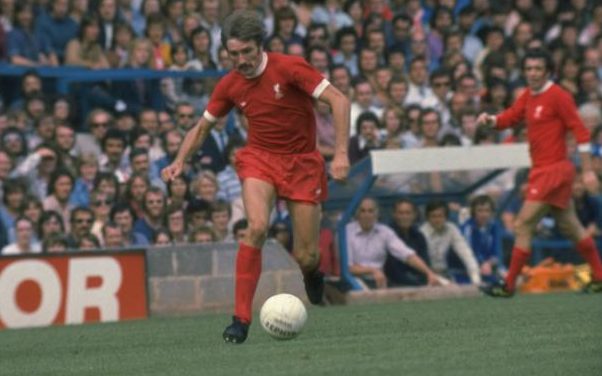
Heighway charges up the field against QPR at Loftus Road in 1975 CREDIT: GETTY IMAGES
He’s an idealist and cynic; a staunch defender of the academy system while freely admitting he despises the overblown pomposity of the word.
“Whoever came up with the word ‘academy’ is an idiot. We’re youth development centres,” he says.
Nevertheless, the bi-annual critiques of these facilities each time England fail at a major tournament irks him.
“Whenever England lose it is easy to blame Academies because 99 per cent of the players have come through the system,” he says.
“What we need from those critics is ideas of what they would do differently. Those kids have to play football somewhere, whether it is school or Sunday league teams or here. We can do more than anyone else, that’s for sure. Why wouldn’t you create these environments with the best facilities and coaches?
“I hear about discipline and toughness. I don’t accept Academies are too soft and certainly not this one. I don’t buy it. When kids come through this door we want discipline, hard work and attitude. I’ve always taken a hard line towards how kids here should be treated. If they make it, there should be no shocks.
“These kids are heading for a well-paid but difficult life. Then they get to 34 and they have to prepare for the world beyond that.
“The balance you need is to know how tough you can be. That must start early. You can’t let them get away with stuff at 10 or 11 and then try to impose discipline at 13. There have to be boundaries. You can’t have an anarchic environment. I’ve always been a disciplinarian. I want there to be respect.
“My mantra is engage, confront, challenge and inspire. When I came back here there was a routine in place where everyone was shaking hands with each other, hundred times a day, before sessions and after training sessions. I said: ‘What’s all this shaking hands for?’
“I’ll shake hands when I meet someone, and shake hands if we’re saying goodbye for the last time, but all the time? To me shaking hands was a way of avoiding communication. I want to talk to people to engage
“Then you have to confront youngster with what they’re doing, and challenge them to be better. After that you have to inspire greatness. When you’ve been tough on someone, can you inspire that person? It is a delicate balance to have respect to inspire but to know when you talk they jump.
“I hate the phrase ‘old school’ but a lot of the ideas of the past are still relevant. In the rush to be modern, don’t kick the baby out with the bathwater and discard everything. Being new and modern is about adding to what has worked before. Not everything in the 60s, 70s, 80s was irrelevant.”
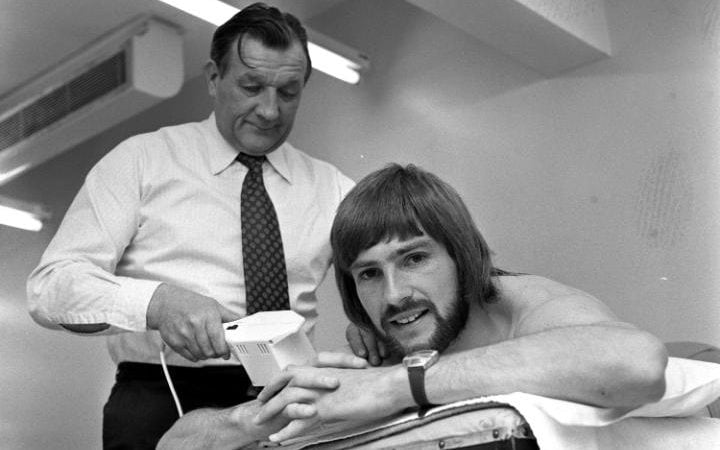
Bob Paisley treats Heighway during the winger's playing days in the 1970s CREDIT: GETTY IMAGES
In line with these ideals, Liverpool’s decision to impose a £40,000 a year salary cap on its first year professionals has earned applause, but Heighway doubts the rest of the country will follow.
“Anything that keeps a young players feet on the ground is worth pursuing. Capping wages is part of that,” says Heighway.
“To have that widespread would be fantastic, but you won’t get it. What will happen is someone will want to take advantage. Someone will be in the ear of a player saying ‘don’t go to Liverpool, you’ll only get £40,000 a year. We’ll give you £100,000’.
“The problem with football is there is no single organisation that exists solely for the good of the game. All have their own interests above the broader good. When organisations take control or get involved where the primary motive is making money, I see dangers. If there were a ruling organisation that did not have its own self-interest many things would be different. There could be more uniformity, such as controls on young players’ wages or the age players can turn professional.
“There is not just one thing that needs to change, but a sensible cap in the early days of a boy’s career is a start. Whatever the industry, you should not be rewarded until you’re successful. In this game, there is no ladder going up just snakes that can take you down quickly. You are rewarded instantly and too easily so we have to prepare our young people for life when their career ends. We have that responsibility.
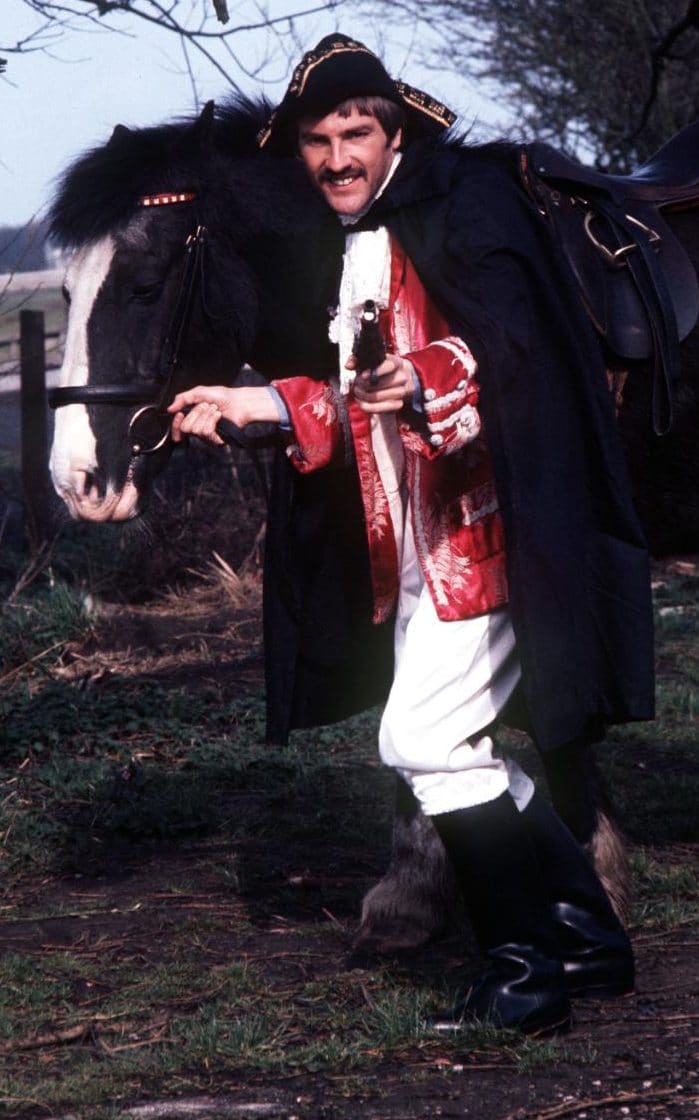
Steve 'the highwayman' poses for a photo-shoot during the 1977 season CREDIT: GETTY IMAGES
“Instead you have a situation where some clubs approach it like they want to conquer the world. All we can do is show we have something so powerful that if Liverpool want you, you go to Liverpool.
That comes with reputation and our quality and our identity. If others want a different identity, leave them to it. We just have to be more appealing. Only the people we have here can make that happen. Our ideal is to show parents that once they realise what is going on here, they won’t want their child to go anywhere else.”
Heighway has always seen his role as creating well-rounded individuals as much as multi-talented players.
“It does give me immense pride when I see what the players who came through here achieved, but I get more pride listening to Carra on TV, or to Steven (Gerrard) and Michael (Owen) whenever they come here. We will always have lunch with Steve McManaman and Robbie Fowler. They are all here all the time.
“When I first met Carragher, Owen and Gerrard I liked them as footballers, but there was something special about them as people. If there were sitting with us now they would be the sharpest cookies in the room. Others who came through who don’t get the same recognition such as Steven Warnock, David Thompson, Jay Spearing, or a young full-back Stephen Darby who played in the lower divisions, were the same.
“My career has been about helping young people. I was tough with them - incredibly tough with them at times. I could be confrontational with them. Not one of them has held it against me. That’s what makes me proud. That’s my style. It’s how I work.
“Not everything can be about technical evaluation. There is more to it. Who you are and what you are is about more than what you can do.
“What drives a player? That’s what makes the best stand out from other technically good footballers. That is what separates your John Terry from others of his generation.
“You can’t measure that. You can’t use science or data to identify that. Physicality, mental strength, personality – those are what you’re looking for to go with the talent. If you don’t have that you will be found out. What I don’t understand is the amount of form filling those running the game want from coaches now, everyone asked to record and write about it all. Coaches want to be on the grass watching and working with players. You can’t superscript football.”
Further academy changes are afoot, Klopp recently confirming a feasibility study is under way to merge the youth and senior teams at one site. That might be at Kirkby, although other venues are under consideration.
Heighway wanted that when the youth centre was opened in 1999.
“In the original debate over this place I asked the board are you sure you wanted that separation. Are you sure you don’t want the first team here in Kirkby?” he said.
“It could have happened. The answer was no. We still have unused land - two acres that could be used. There are advantages to being on the same site. You can talk to each other by walking across a pitch instead of making an appointment.”
The lingering, most fundamental question remains: why, after such unprecedented success in 1990s, did so few follow Gerrard as the last, genuinely word class academy player to play for the senior side?
“It is more difficult now. The market shrunk,” says Heighway.
“Until the 1990s there were a couple of hundred young players competing for a couple of hundred first team places in a top division team. Now there are thousands from every country in the world. You have to be so good to get a chance and there are few opportunities for English players. That is a big part of it. With some players you just don’t know how good they will be until they go down the tunnel, and now there are fewer chances to go down that tunnel. It’s not a sinister reason. Fewer players are coming through everywhere because it is enormously difficult. Some people talk about quotas but they are unworkable. How can you enforce that? Who has the power to do it?
“Nothing will change on that front. How can it? All you can do is the best you can based on your ideals and your club’s identity, pass a player to Jurgen Klopp you’re sure is good enough at the age of 17, and then it is up to the manager to do what he feels is his best for his team.”
Crucially, Klopp has vowed to grant opportunities and reward emerging talent - as demonstrated by new contracts last week for teenagers Trent Alexander-Arnold and Ben Woodburn. Liverpool realise their greatest selling point at the moment is their manager.
“There is no relationship between football now and from the Bill Shankly days, but that does not mean the people from the past did not leave an indelible mark on the football club,” he says.
“There has been enormous change at Liverpool, but when I see what is happening here now - and what the first team are doing - I approve. And I think Shanks would approve, too.
“He’d approve of the ethics. He’d approve of the work rate. He’d approve the way the first team is playing. And he’d approve the way we are treating the youngsters. He would like that. He would like that a lot.”
Liverpool legend Steve Heighway says Bill Shankly would approve of the side that is developing under Jurgen Klopp
2 Comments

Steve Heighway oversaw the development of the Liverpool Academy before the Irishman left the club in 2007, but the former winger is now back at the club CREDIT:GETTY IMAGES
15 NOVEMBER 2016 • 6:48PM
Steve Heighway, legendary left winger, protégé of Bill Shankly and architect of Liverpool’s academy, thought he had retired.
Across four decades he had served the club as player, coach and, latterly, academy director, stepping down in 2007 and heading to Florida to spend free hours coaching youngsters at the Clearwater Charges – a club he founded.
His legacy was left to an assortment of successors taking his vision in a different direction. Then, two years ago, he received a surprise call from current academy director Alex Inglethorpe.
Inglethorpe wanted to restore and evolve the Heighway legacy that prompted his most famous apprentices Steven Gerrard, Jamie Carragher, Michael Owen, Robbie Fowler and Steve McManaman to cite him as the greatest of influences.

Robbie Fowler (top) and Steve McManaman both learned their trades under Heighway CREDIT: GETTY IMAGES
All had spoken to Inglethorpe and cursed the fact Heighway was no longer around, believing it an unhealthy consequence of the club’s debilitating internal politics during the tempestuous era of Tom Hicks and George Gillett Jr.
Heighway and Inglethorpe met in Formby Golf Club, a short drive from the Kirkby academy.
“I didn’t know Alex at that time,” says Heighway. “I was impressed with him from day one. He wanted to know what I felt to be the values, the ethics and the standards of Liverpool. The ideals. He had his own ideas, but wanted to get back to the basics of the foundation of what this club stands for.
“Then he invited me in for some evenings to work with the 12 and 13 year-olds. I didn’t want payment for it. It was such a joy to come back and work with the youngsters. It is like living a second childhood.”

Alex Inglethorpe (left) and Jurgen Klopp in discussion at the club's Academy in Kirkby CREDIT: GETTY IMAGES
Last season, Inglethorpe formalised the arrangement, offering Heighway a mentoring role for coaches and players. Heighway is a full-time, paid Liverpool employee again, Inglethorpe determined the distinguished figures of the club’s past continue to shape its future.
“I had to give a lot of thought to how I conducted myself when I walked back in. I designed this place, but Alex is the director here. He’s the boss,” said Heighway, now just short of his 69th birthday.
“There was some emotion there. It meant a lot to my family. They were especially thrilled.”
Heighway’s return represents far more than the homecoming of an Anfield grandee. It is a symbol of a club restoration project.
Heighway left at time when the academy and first-team manager did not speak, let alone agree how to develop its young talent. In 2004 Liverpool decided to follow Arsenal’s ‘Fabregas model’ of signing overseas players in their mid to late teens. Disillusionment grew in Kirkby, where the local boys felt their route to the first team had an additional obstacle imposed by their own club. It was the essence of the philosophical argument that echoes across English football– is the shortage of England players due to lack of talent or opportunity?
“I never wanted to be piggy-in-the-middle of an intellectual debate. I saw youth development in a different way so it was time to exit stage left,” says Heighway.
“Rafa Benitez set up a mini-academy at Melwood. The children from here were not going to get the first look-in. There was no conflict. We just didn’t communicate.
“A manager must have what he wants. If the manager wants one thing and someone else wants something else, why would the board not support the manager? That would make no sense.
“But I didn’t leave with any sense of bitterness. I needed a rest. I was tired. It was hard running this place.
“We’d come from a youth department in 1989 working out of Melwood with a couple of coaches to this huge facility. I was put in charge when we built this in 1999 but I had no management skills. I was not trained to do it – it was on the hoof. By 2007 I was ready for a break.”
Heighway’s return is no mere emotional gesture. Inglethorpe recognised a visionary: a man of experience and immense intellectual weight - a moderniser connecting Liverpool not just to its glorious history but, perhaps more significantly, its conscience.
Heighway baulks at the idea of being perceived with such reverence, but you need only a few minutes in his company to realise coaching – and more specifically coaching Liverpool’s next generation - is a vocation, not a job.

Heighway charges up the field against QPR at Loftus Road in 1975 CREDIT: GETTY IMAGES
He’s an idealist and cynic; a staunch defender of the academy system while freely admitting he despises the overblown pomposity of the word.
“Whoever came up with the word ‘academy’ is an idiot. We’re youth development centres,” he says.
Nevertheless, the bi-annual critiques of these facilities each time England fail at a major tournament irks him.
“Whenever England lose it is easy to blame Academies because 99 per cent of the players have come through the system,” he says.
“What we need from those critics is ideas of what they would do differently. Those kids have to play football somewhere, whether it is school or Sunday league teams or here. We can do more than anyone else, that’s for sure. Why wouldn’t you create these environments with the best facilities and coaches?
“I hear about discipline and toughness. I don’t accept Academies are too soft and certainly not this one. I don’t buy it. When kids come through this door we want discipline, hard work and attitude. I’ve always taken a hard line towards how kids here should be treated. If they make it, there should be no shocks.
“These kids are heading for a well-paid but difficult life. Then they get to 34 and they have to prepare for the world beyond that.
“The balance you need is to know how tough you can be. That must start early. You can’t let them get away with stuff at 10 or 11 and then try to impose discipline at 13. There have to be boundaries. You can’t have an anarchic environment. I’ve always been a disciplinarian. I want there to be respect.
“My mantra is engage, confront, challenge and inspire. When I came back here there was a routine in place where everyone was shaking hands with each other, hundred times a day, before sessions and after training sessions. I said: ‘What’s all this shaking hands for?’
“I’ll shake hands when I meet someone, and shake hands if we’re saying goodbye for the last time, but all the time? To me shaking hands was a way of avoiding communication. I want to talk to people to engage
“Then you have to confront youngster with what they’re doing, and challenge them to be better. After that you have to inspire greatness. When you’ve been tough on someone, can you inspire that person? It is a delicate balance to have respect to inspire but to know when you talk they jump.
“I hate the phrase ‘old school’ but a lot of the ideas of the past are still relevant. In the rush to be modern, don’t kick the baby out with the bathwater and discard everything. Being new and modern is about adding to what has worked before. Not everything in the 60s, 70s, 80s was irrelevant.”

Bob Paisley treats Heighway during the winger's playing days in the 1970s CREDIT: GETTY IMAGES
In line with these ideals, Liverpool’s decision to impose a £40,000 a year salary cap on its first year professionals has earned applause, but Heighway doubts the rest of the country will follow.
“Anything that keeps a young players feet on the ground is worth pursuing. Capping wages is part of that,” says Heighway.
“To have that widespread would be fantastic, but you won’t get it. What will happen is someone will want to take advantage. Someone will be in the ear of a player saying ‘don’t go to Liverpool, you’ll only get £40,000 a year. We’ll give you £100,000’.
“The problem with football is there is no single organisation that exists solely for the good of the game. All have their own interests above the broader good. When organisations take control or get involved where the primary motive is making money, I see dangers. If there were a ruling organisation that did not have its own self-interest many things would be different. There could be more uniformity, such as controls on young players’ wages or the age players can turn professional.
“There is not just one thing that needs to change, but a sensible cap in the early days of a boy’s career is a start. Whatever the industry, you should not be rewarded until you’re successful. In this game, there is no ladder going up just snakes that can take you down quickly. You are rewarded instantly and too easily so we have to prepare our young people for life when their career ends. We have that responsibility.

Steve 'the highwayman' poses for a photo-shoot during the 1977 season CREDIT: GETTY IMAGES
“Instead you have a situation where some clubs approach it like they want to conquer the world. All we can do is show we have something so powerful that if Liverpool want you, you go to Liverpool.
That comes with reputation and our quality and our identity. If others want a different identity, leave them to it. We just have to be more appealing. Only the people we have here can make that happen. Our ideal is to show parents that once they realise what is going on here, they won’t want their child to go anywhere else.”
Heighway has always seen his role as creating well-rounded individuals as much as multi-talented players.
“It does give me immense pride when I see what the players who came through here achieved, but I get more pride listening to Carra on TV, or to Steven (Gerrard) and Michael (Owen) whenever they come here. We will always have lunch with Steve McManaman and Robbie Fowler. They are all here all the time.
“When I first met Carragher, Owen and Gerrard I liked them as footballers, but there was something special about them as people. If there were sitting with us now they would be the sharpest cookies in the room. Others who came through who don’t get the same recognition such as Steven Warnock, David Thompson, Jay Spearing, or a young full-back Stephen Darby who played in the lower divisions, were the same.
“My career has been about helping young people. I was tough with them - incredibly tough with them at times. I could be confrontational with them. Not one of them has held it against me. That’s what makes me proud. That’s my style. It’s how I work.
“Not everything can be about technical evaluation. There is more to it. Who you are and what you are is about more than what you can do.
“What drives a player? That’s what makes the best stand out from other technically good footballers. That is what separates your John Terry from others of his generation.
“You can’t measure that. You can’t use science or data to identify that. Physicality, mental strength, personality – those are what you’re looking for to go with the talent. If you don’t have that you will be found out. What I don’t understand is the amount of form filling those running the game want from coaches now, everyone asked to record and write about it all. Coaches want to be on the grass watching and working with players. You can’t superscript football.”
Further academy changes are afoot, Klopp recently confirming a feasibility study is under way to merge the youth and senior teams at one site. That might be at Kirkby, although other venues are under consideration.
Heighway wanted that when the youth centre was opened in 1999.
“In the original debate over this place I asked the board are you sure you wanted that separation. Are you sure you don’t want the first team here in Kirkby?” he said.
“It could have happened. The answer was no. We still have unused land - two acres that could be used. There are advantages to being on the same site. You can talk to each other by walking across a pitch instead of making an appointment.”
The lingering, most fundamental question remains: why, after such unprecedented success in 1990s, did so few follow Gerrard as the last, genuinely word class academy player to play for the senior side?
“It is more difficult now. The market shrunk,” says Heighway.
“Until the 1990s there were a couple of hundred young players competing for a couple of hundred first team places in a top division team. Now there are thousands from every country in the world. You have to be so good to get a chance and there are few opportunities for English players. That is a big part of it. With some players you just don’t know how good they will be until they go down the tunnel, and now there are fewer chances to go down that tunnel. It’s not a sinister reason. Fewer players are coming through everywhere because it is enormously difficult. Some people talk about quotas but they are unworkable. How can you enforce that? Who has the power to do it?
“Nothing will change on that front. How can it? All you can do is the best you can based on your ideals and your club’s identity, pass a player to Jurgen Klopp you’re sure is good enough at the age of 17, and then it is up to the manager to do what he feels is his best for his team.”
Crucially, Klopp has vowed to grant opportunities and reward emerging talent - as demonstrated by new contracts last week for teenagers Trent Alexander-Arnold and Ben Woodburn. Liverpool realise their greatest selling point at the moment is their manager.
“There is no relationship between football now and from the Bill Shankly days, but that does not mean the people from the past did not leave an indelible mark on the football club,” he says.
“There has been enormous change at Liverpool, but when I see what is happening here now - and what the first team are doing - I approve. And I think Shanks would approve, too.
“He’d approve of the ethics. He’d approve of the work rate. He’d approve the way the first team is playing. And he’d approve the way we are treating the youngsters. He would like that. He would like that a lot.”

